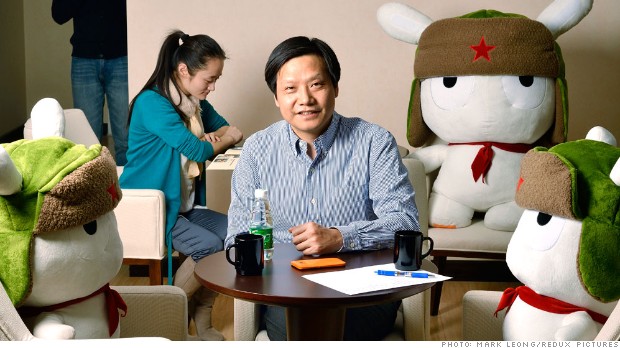
Talk about a wild idea: In 2010, Lei Jun launched Xiaomi, a mobile-phone company that aimed to go head to head in China with Apple(AAPL, Fortune 500), Samsung, Lenovo, and other deep-pocketed purveyors of high-end phones. Xiaomi (pronounced SHAO-may) has not just held its own against the big guys; it has soared. Sales last year hit more than $5 billion, up 150%. And the privately held company has a $10 billion valuation. Lei, 44, says Xiaomi, whose phones run on Google's (GOOG, Fortune 500) Android operating system, owes its success to its strong interaction with customers. As the company embarks on a major expansion in Asia -- it entered Singapore earlier this year, and India and Malaysia are expected to soon follow -- Lei spoke with Fortune about why he thinks Xiaomi (the word means "millet") will translate in other markets.
How did you decide which countries to enter?
Lei: Our initial plan includes 10 countries from Asia, Europe, and Latin America. They all satisfy three criteria: The smartphone business is about to hit a tipping point; social networking services are highly mature; they all have fine e-commerce infrastructures. As a result, we selected Russia, Turkey, Brazil, Mexico, and India, among others, as our next stops.
Other Chinese smartphone vendors, notably Lenovo, have exported a successful model selling high-quality/low-cost devices to other developing markets where they already have brand recognition and a retailing network. How can you compete?
In some sense, we are cooperating with them to build the reputation of Chinese brands. We differ in that we are copying our own Xiaomi model to these markets. We treat users as friends, asking them to help us improve, and we follow a strategy of product excellence with only seven or eight products.
The intense competition in smartphones seems to be driving margins down. How do you deliver profits to match your $10 billion valuation?
Xiaomi is known for its business model based on keeping the cost to the designed minimum. And we have the world's top operational efficiency. Besides, we make profits from the [software and services] on top of our hardware platform.
How are you pushing the edges of Android ecosphere?
We have lots of innovations. For example, the single-click access to pre-stored free Wi-Fi hotspots turned out to be very popular. Another example is the automatic interception of spam calls.
You've mentioned that one goal is to become a Fortune Global 500 company. Why is that, and do you have a timetable?
Some people say Xiaomi is an overnight success, and therefore it won't last long. I hope Xiaomi will become a Fortune Global 500 company sometime soon in order to show that our business model and our fast development are sustainable.
No comments:
Post a Comment